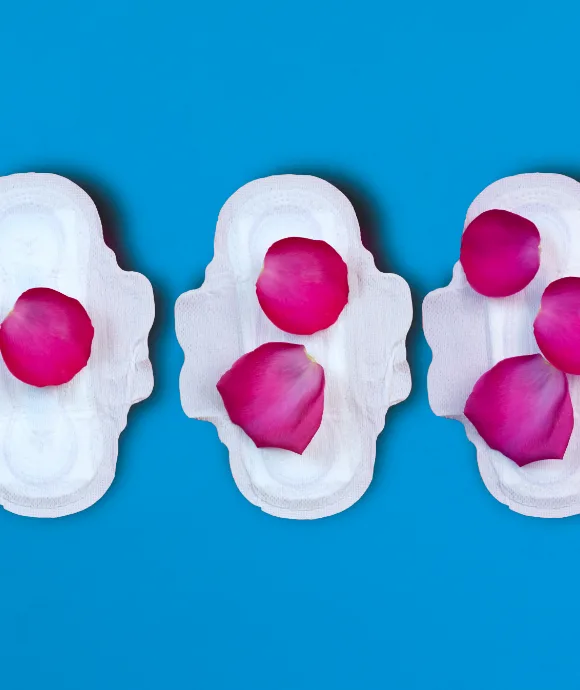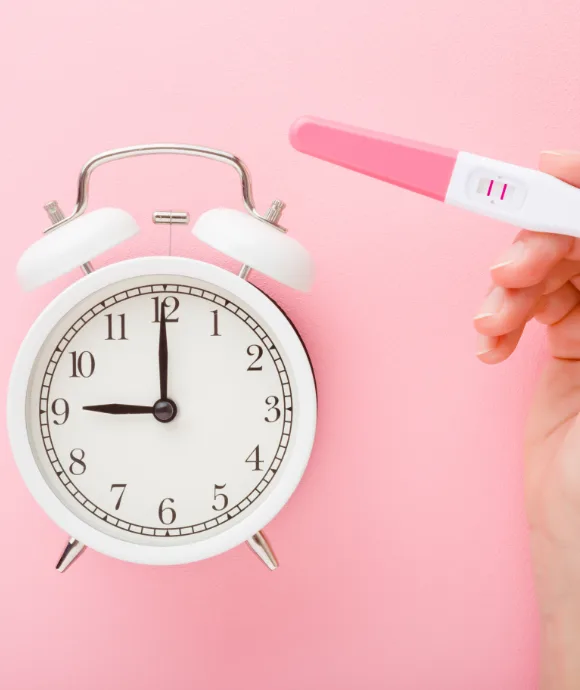Implantation Bleeding vs Period: What’s the Difference?

If you are experiencing vaginal bleeding or spotting you might have questions you need answered. This kind of bleeding or spotting may be an early sign of pregnancy implantation bleeding.
It is beneficial to learn about the difference between implantation bleeding vs period so that you are not rattled or flummoxed if you look down at your underwear and notice blood when you are not expecting it. This guide will help you by answering questions about pregnancy spotting vs period in the most informative way possible.
What Is Implantation Bleeding?
Implantation bleeding occurs when a fertilised egg nestles in the uterus and sometimes it sheds the uterine lining. This is considered to be the earliest signs of pregnancy and there's nothing to be alarmed about. You shouldn't confuse it with ovulation bleeding. The key difference between ovulation bleeding vs implantation bleeding is that the former occurs around the time when your body releases an egg.
Here are a few more things to know about implantation bleeding:

The Implantation Bleeding Colour
Women dealing with implantation bleeding are likely to experience pink or brownish implantation bleeding.

Timing of Implantation Bleeding
Implantation bleeding occurs a little earlier than your expected period date. It takes place 7 to 10 days after conception or fertilisation. You can try and track your overall cycle so that you can learn the difference between implantation bleeding and periods.
Ovulation: When an ovary releases an egg to prepare the body for what could possibly be a pregnancy, it occurs in the middle of your cycle.
Menstrual cycle: The average menstrual cycle lasts 28 days, and ovulation takes place two weeks after. If your menstrual cycle is longer than 28 days, then the ovulation timeline can be affected. Although the egg is viable for only about 24 hours, it is difficult to pinpoint the exact time it is released into your fallopian tube. Certain kinds of birth control work by interfering with the sperm’s ability to reach the egg. This, in turn, reduces the likelihood of fertilisation. Certain birth control methods tend to thin the uterine lining so that fertilisation does not occur; in such cases, the egg is less likely to attach to the uterus.
Implantation: Implantation happens between 6 to 12 days. It takes place only if the egg is fertilised and attaches to the uterine lining. If your body follows a 28-day menstrual cycle, then you are likely to experience implantation between 20 to 26 days. If you notice light spotting, then it could be a sign of implantation. Lastly, if you continue bleeding more and more, then it could suggest that you are menstruating.
In brief, this sums up implantation bleeding vs period. To learn about it in detail, please continue reading.

Differences between implantation bleeding and periods
It isn't simple to spot the difference between implantation bleeding vs period. But there are a few signs and symptoms that could help you understand the situation you are dealing with.

1. Flow
If you are experiencing super-light spotting, it's likely to be dark brown or red implantation bleeding. On the other hand, your period flow would begin slowly and become heavy in a day or two. Either way, you should use highly absorbent sanitary pads like the Always Maxi Thick Pads which protect you for hours at stretch. But the protection shouldn't end here. You can also choose Always Night Dreamzzz Pads whose innovative extra-absorbent core will keep you protected and comfortable through the night.

2. Length of flow
It takes one to three days for implantation bleeding to go away whereas your period lasts for four to seven days.

3. Colour
The implantation bleeding colour is usually pink or brownish but when it comes to your monthly menstrual periods, you might experience a light pink or brownish colour at first and then it will turn into bright red.

4. Clots
If you see any clots in your blood, be assured it's your monthly period. It's because implantation bleeding doesn't combine blood with tissues.

If you see any clots in your blood, be assured it's your monthly period
5. Consistency
Implantation bleeding results in on and off spotting. Bleeding that starts lighters and gets heavier is characterised as your period.

6. The intensity of cramps
Cramps that are light and short-lived are to be associated with implantation bleeding. In comparison, period cramps are more intense and last longer. In the end, it depends on your pain tolerance levels.
Additionally, you might also experience swollen breasts and headaches during implantation bleeding.
7. Causes of implantation vs period bleeding
If you are trying to differentiate between implantation bleeding or period bleeding, then you need to notice the colour and consistency. Implantation bleeding is lighter in colour and not as consistent. Meanwhile, period blood is darker and more consistent.
8. Accompanying symptoms
You need to be aware of the accompanying symptoms that come with both scenarios if you want to efficiently be able to tell the difference between implantation bleeding and period. For instance, if you are bleeding due to implantation, it could last for about 1 to 3 days. Meanwhile, if you are bleeding due to periods, then that ought to last for about 3 to 7 days. Also, it is important to note that implantation bleeding could take place a bit earlier than when you would expect to get your period.

Other Causes of Light Bleeding or Spotting
There can be numerous reasons why you may experience light bleeding or spotting. Listed below are a few of the reasons:
Pregnancy: It is common to experience spotting during pregnancy. Pregnancy spotting vs period can often cause confusion, but one is lighter, while the latter is heavier. About 15 to 25 per cent of pregnant individuals experience spotting during their first trimester. The bleeding is light in colour and could be the colours red, pink and brown. Spotting is not a cause for concern. However, it is important to seek medical intervention immediately if spotting is coupled with pelvic pain or heavy bleeding. These could suggest an ectopic pregnancy or miscarriage.
Birth control: You are likely to experience spotting between periods if you are using birth control like pills, patches, injections, rings and implants. Spotting can also take place if you begin using hormone-based birth control methods, skip doses or don’t follow birth control pills instructions, change the kind of birth control you use or if you are using birth control for a long time.
Ovulation: Ovulation spotting takes place during your menstrual cycle when an ovary releases an egg. This occurs 14 days before menstruation. This kind of spotting could be red or light pink, lasting for 1 or 2 days amidst your menstrual cycle.
Perimenopause: During the transitional period of menopause, your periods may become way more irregular, and you could perhaps experience spotting. Moreover, you might miss your periods altogether or experience menstrual bleeding that is lighter or heavier than usual.
Trauma: You can experience spotting if your vagina or cervix has experienced trauma of any kind.
Stress: Stress can affect your body and cause your periods to fluctuate. Some people experience vaginal spotting from high levels of emotional or physical stress.
Medications: There are medications that can cause spotting between periods. These medications include blood thinners, thyroid medication and hormonal drugs.
When To Take A Pregnancy Test
Since symptoms of implantation bleeding highly coincide with the menstrual period, it's a little difficult to draw a conclusion whether you are pregnant or not. Here, the best way to be sure is to wait for a few days and then take a pregnancy test. Factors like the timing of your last intercourse can help you derive the right results.
Tracking your monthly cycle and your potential date of conception would make things easier for you. Likewise, noting your symptoms and mapping your timeline can help you know when to take the pregnancy test. In case you experience unusual bleeding or have any concerns related to vaginal bleeding, you should consult with your doctor. It's best to put your mind at ease with the right professional assistance.
If you have found this article helpful when it comes to answering your questions about implantation bleeding vs period or pregnancy spotting vs period, then be sure to share this article with anyone who might reap its benefits.
Interested in knowing more? Learn everything about brown discharge during periods.

Interested in knowing more? Learn everything about brown discharge during periods.
Disclaimer
Please note the date of last review or update on all articles. No content on this site, regardless of date, should ever be used as a substitute for direct medical advice, diagnosis or treatment from your doctor or other qualified clinician. Always is committed to ensuring that all of our products meet rigorous safety standards; Always pads prioritize safety, protection and comfort of its consumers.










